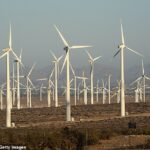Energy News Beat
Global investments in trendy sustainability assets shrank by nearly $5 trillion over two years, researchers say, as US and other financiers soured on investments seen as risky and opaque.
In its biannual assessment, the Global Sustainable Investment Alliance (GSIA) said on Wednesday that investors had $30.3 trillion in sustainable assets in 2022, down from $35.3 trillion in 2020.
In the US, where Republicans have railed against ESG funds, which push for environmental, social, and governance benefits, such assets plunged from more than $17 trillion to just $8.4 trillion over the same period.
The drop in part reflected changes in how ESG assets were measured and classified.
Will Hild, executive director of Consumers’ Research, a non-profit, called the drop-off ‘startling.’
‘The market for ESG bonds decreased significantly in the past two years as state leaders from across the country have fought back against the injection of woke politics into the bond market,’ he told DailyMail.com.
ESG refers to a set of standards for a firm’s behavior that guide investors on where to put their money — for example, by funding wind farms to combat climate change, while pulling out of harmful oil and tobacco giants.
The strategy gets more controversial when it guides funding to firms promoting diversity, equity, and inclusion (DEI) schemes, which irk conservatives, who say they help women and minorities by sidelining white men.
This has spawned a fractious debate about whether efforts to make society fairer and cut carbon emissions are in the strategic interest for investors, by mitigating the risks of climate chaos and social disorder.
ESG investing boomed in the pandemic, when lockdowns caused energy prices to fall and buoyed portfolios that shunned fossil fuels.
Those same strategies have floundered as lockdowns ended and economic activity resumed.
Questions about the future of sustainable finance persist in the US as lawmakers from more than a dozen states, from Florida to Utah, try to fight the incorporation of ESG principles into business and investing.
In the rest of the world, ESG-related assets are still growing, according to GSIA, which reports on the market every two years.
Sustainable investments rose more than 20 percent in Canada, Europe, Japan, Australia, and New Zealand between 2020 and 2022, the alliance said.
But the breathless pace of the ESG boom that characterized the previous decade appears to be winding down and even reversing as ever more traders and fund managers sour on the asset class.
The S&P Global Clean Energy Index has plunged 30 percent this year, as higher interest rates and supply-chain bottlenecks hammer wind and solar stocks.
A recent Bloomberg survey showed that investors expect the downturn to continue into 2024, with the negative sentiment extending to Tesla and other electric carmakers.
‘Sustainable bonds make for bad investments when they actually meet the radical left’s definition of sustainable, and when they don’t, Wall Street greenwashes them to justify the higher fees they charge for selling them,’ added Hild.
‘It’s a scam on investors either way.’
GSIA researchers said the trend was downward — the proportion of sustainable assets is shrinking by 5 percent each year, as regulators ratchet up disclosure requirements and the definition of ESG assets are tightened.
‘The industry is maturing,’ James Alexander, the chairman of GSIA, told reporters.
‘We’re thinking more carefully about how do we avoid inadvertently perhaps greenwashing through the actions that we take.’
New regulations across jurisdictions is forcing asset managers to justify ESG claims that previously went unchecked, researchers said in their report.
There’s a ‘need for clearer definitions and a more shared understanding around what makes a sustainable asset ‘sustainable,’ said the 47-page document.
Matthew Tuttle, CEO of Tuttle Capital Management, which manages ‘non-woke’ funds, said the ESG sector was a covert vehicle for liberal politics and was ripe for a reckoning.
‘Companies have a fiduciary duty to shareholders and should not be trying to do things that they can’t get done at the ballot box,’ Tuttle told DailyMail.com.
ENB Top News
ENB
Energy Dashboard
ENB Podcast
ENB Substack
The post Woke capitalism’s comeuppance: investments in trendy ‘ESG’ assets collapsed by $5 trillion in just two years, as Republican backlash and tumbling wind and solar stocks upend the sector appeared first on Energy News Beat.








